Apparently, the LSO is preferred orchestra for a media franchise known as Final Fantasy. The composer is Nobuo Uematsu. Here’s the latest instalment, Words Drowned by Fireworks from Final Fantasy VII, out next month.

Criticism fails.
Apparently, the LSO is preferred orchestra for a media franchise known as Final Fantasy. The composer is Nobuo Uematsu. Here’s the latest instalment, Words Drowned by Fireworks from Final Fantasy VII, out next month.

Criticism fails.
The death is reported of Joseph Scafidi,who sppent his whole career at the San Francisco Symphony and was its chief executive from 1964 to his retirement in 1978. Joe was 94, a lover of music from infancy.
When he joined the orch it had an 18-week season and a budget of $200,000. His music directors were, successively: Enrique Jorda, Joseph Krips, Seiji Ozawa and Edo de Waart.
Obituary here.
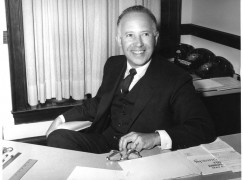
Bill Cogan Photography
These are Cleveland statistics, relayed to a Salzburg newspaper. Shocking for a festival where the average attendance age is posthumous plus six.
No need to worry, says Franz: music is not dead yet. Read here (auf Deutsch).

Mikhail Gantvarg, 68, rector of the St. Petersburg State Conservatory, has been sacked by the Culture Minister, Medinsky.
It follows an open letter sent to the minister by heads of other institutions, demanding Gantvarg’s resignation.
He had been in the job four years. His predecessor was dismissed in similar circumstances.
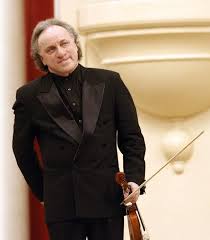
Everything in Putin’s Russia has to be cleared from the top oligarch down. Gantvarg would not have been fired without Valery Gergiev’s consent.
The tenor Lawrence Brownlee has given a gentle, self-aware interview to Fathering magazine on how to maintain a life on the international stage with the needs of a challenging child at home.

I travel about 9 months a year. I talk to my agent to schedule as much time as I can at home without hurting my career. But if you’re in this business, you have to be out and about so people will see you.
I do hate leaving my wife and kids. I’ve missed so many milestones, especially my son with his special needs. I’ll come home and I’m amazed at some of the things he can do, but I see the struggles he had as well. I tell my wife I wish I could sing in all of these important theaters and come home at night — that would be ideal. If somebody from Star Trek would really invent that teleporter where you could do what you do and still be home at night, that would be fantastic, but that’s not reality.
Read the full interview here.
The pianist with the ear infection has been cleared by his doctors to fly – not for tomorrow’s concerto performance at the Edinburgh Festival, which has been reassigned, but to his solo recital on Friday.
He says: Thank you to all my friends for the support. My ear is much better now and the doctor says that I’m ok to fly. See you in Edinburgh – I can’t wait to perform my debut recital there!

This is Steven M. Zeitels, director of the Massachusetts General Hospital Voice Center:
‘A lot of what’s considered aging isn’t really aging when it comes to voices. It’s long-term trauma. If someone has used their voice a lot, their vocal cords stiffen. We are working on materials — we just received our second patent — for synthetic materials we can put in the vocal cords to make them soft. It will be just as important what you put into a vocal cord as what you remove, and that’s the future within the next three to five years.’
Soon enough for the man below? Read more here.

The FT’s Richard Fairman wrote a thoughtful piece for Opera News about the parlous state of English National Opera. Then artistic director John Berry resigned, turning the future on its head.
Richard had to cast his piece. He quotes me as saying: ‘The company is in a perpetual state of siege. Fundraising has been poor. Media relations have been poor. Personal relationships have ceased to function within the company, leading to a drip-drip-drip of executives resigning, and the relationship with the Arts Council has broken down…. The level of hostility towards ENO at the Arts Council is astonishing.’
So what hope now for besieged ENO? Read Richard’s piece here.

The Norwegians know the value of a Euro (that’s why they never joined the EU).
Instead, the Oslo Phil has got together with property developers to build itself a hall. This way, everyone makes money and a good acoustic is guaranteed. Press release below.
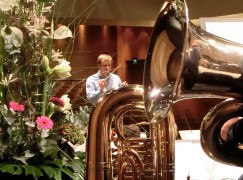
press release:
The Oslo Philharmonic, together with Norwegian property developers Anders Buchardt and Petter Stordalen, has drawn up plans for the building of a new concert hall in Oslo. Situated centrally in the city on the waterfront at Filipstad, the building will be financed, built and run by the property developers Buchardt and Stordalen, with the Oslo Philharmonic as the principal tenant. The project will be financed in conjunction with the building of a large congress hotel on the neighbouring property.
“This is the first time in our almost 100-year history that we have the chance to build a hall specifically designed for the orchestra”, says Ingrid Røynesdal, CEO of the Oslo Philharmonic.
“The Oslo Philharmonic has a strong audience base and significant international standing. A new hall is the most important factor now for our continued development. It will be a significant addition to the thriving cultural life of Oslo, boosting the city’s already strong international musical reputation”, says Røynesdal.
The Oslo Philharmonic Orchestra was not part of the planning and building processes of the current Oslo Concert Hall. This resulted in a hall that from the outset was far from ideal for the requirements of a modern orchestra and its audiences. Since the 1980s, repeated attempts have been made to put the case for a new hall. Optimal acoustics, audience facilities and stage facilities will be prioritised this time around, creating a world class concert venue available to Oslo’s thriving acoustic music scene.
“We have a unique window of opportunity here to build a concert hall for the future in the very heart of the city”, says Røynesdal. “We hope people will see what a fantastic chance this is. For the project to become a reality, our politicians need to grant the final planning permission for the redevelopment of the Filipstad area.”
“The concert hall in conjunction with the congress hotel, will generate activity in the Filipstad area both day and night. The aim is to create an attractive, exciting public arena accessible for everyone. This is a project where everyone’s a winner. It will be a huge boost to the city’s cultural life, to the cityscape of Oslo, and will be a space for locals and tourists to use and enjoy”, says Anders Buchardt.
“We have already proved that such a collaboration can be successful. In Malmö in Sweden, visionary politicians, arts leaders and the business community have joined forces to create a magnificent combined cultural centre and congress hotel. The result is a new focal point for the city. We now have the chance to do the same for Oslo”, says Petter A. Stordalen.
If the project is given the green light, design proposals will be invited from international architects. The actual building process could be completed within two and a half years from the laying of the first foundations.
The composer Christopher Gunning, a passionate Sibelian, has been on pilgrimage this summer to the composer’s home and listened to performances of his symphonies by two eminent and very different interpreters. So which has more of the answers? Read his report and reviews for Slipped Disc.
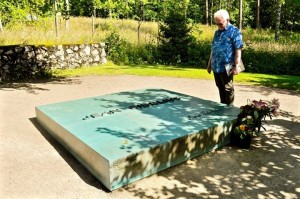
Have you been to Finland? No? Neither had I until a couple of weeks ago, when my son-in-law, a fine horn player, was taking part in performances of Sibelius with the Chamber Orchestra of Europe under Sakari Oramo. These were part of the Turku Music Festival, and the concerts featured the 3rd, 4th, 5th, 6th and 7th symphonies.
Turku is a coastal town with a pretty river running through, and anyone would like it; it’s full of lively cafés and restaurants serving food ranging from McDonalds to distinctly classy; most buildings are low, some characterfully ancient and some rather Germanic and quite new. The city is neither large nor small, is clean and tidy, and is rather quiet and safe. The Chamber Orchestra of Europe is large by chamber ensemble standards, but nevertheless has only roughly half the number of string players found in a normal symphony orchestra. The late Sibelius specialist, Paavo Berglund, recorded the symphonies with this orchestra, reportedly to gain extra clarity, and the legend lives on; Oramo is well aware of Bergland’s work and has obvious respect for it. So how did the symphonies come over in Turku’s acoustically fine hall?
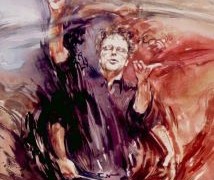
The first thing to say is that at no time did I feel a lack of strength or grandeur; In the 5th and 7th did one wish for more body from the strings? No! All sorts of details came shining through that even I, who has been listening to these works on and off for almost 50 years, had not previously been conscious of. The woodwind playing was consistently delightful – lovely sensitive sounds – and the brass magisterial or quietly threatening by turns. Not an original thought this, but Sibelius’s orchestration really is truly extraordinary isn’t it? The wide compass of the horn parts, the frequently low register of the 2nd clarinet, and 101 other details strike me as totally original. There isn’t another composer who sounds remotely like Sibelius, and it’s not just a matter simply of his characteristic forms, personal motifs, or that unique orchestration – it’s all three and an awful lot of sheer passion too.
Oramo understands this music completely; the orchestra loves him, listens attentively to all his comments in rehearsal, and everyone plays angelically. I came away from the seventh feeling shattered; all the symphonies, every single one, has its very own narrative, but it’s the seventh that never fails to reduce me to blabbering wreck status.
The next day we drove for a couple of hours to Ainola; when in Finland you have to go there! This is where Sibelius lived from 1904 until his death in 1957. He and Aino, his wife, lived in a fine wooden house in the country, where lakes and forests abound, and when you visit you will see the rooms downstairs full of books and paintings, the whole place still haunted by the great man. You will be told that he didn’t use a piano; the music was all in his head.
Believe that if you will, but there are also stories of him pounding away at the piano, and we know that composing was by no means easy for Sibelius – just look at his various attempts to finalise the 5th symphony or the Violin Concerto. We know that he would walk for hours in the forest, or sit in the garden absorbing the sounds of nature, and we also know that for years he composed in an upstairs room (where visitors are not allowed at the moment) so this gives some credence for his not using a piano, but he was also a good pianist and his neglected piano pieces are certainly very pianistic.
Why did he stop composing for the last thirty years of his life, and why did the much-vaunted 8th Symphony never appear? There are no answers at Ainola. Perhaps he was simply worn out with the stresses of composing, or depressed that he was no longer the enfant terrible, Arnold Schoenberg having become the rage among contemporary music fanatics. We will never know, but we have learned that he burned a significant pile of manuscripts and was reportedly a happier man once the flames had consumed any sketches there may have been.
While at Ainola you will visit Sibelius’s and Aino’s tomb, a blue slab with simple lettering, and I defy anyone not to be moved by it. The music, so alive and so much loved, rings in your ears as you stand staring at the slab, then your eyes wander to the all-important sauna designed by Aino, the house, and her garden, full of apple trees and gooseberry bushes heavy with red fruits. You half expect the Sibelius couple, their daughters behind, to appear through the trees.
Back home again, and a visit to the Proms for the 5th, 6th, and 7th symphonies, this time with the BBC Symphony Orchestra conducted by another Sibelian, Osmo Vänskä, who has been responsible for extensive recordings of Sibelius and also some earlier versions of the works we know and love – the 5th and Violin Concertos being of special interest. I was a little nervous – could this concert possibly match the experiences I’d had in Turku?
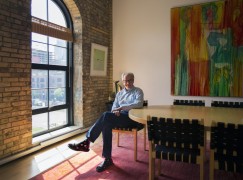
I need not have worried. Vänskä is also steeped in the Berglund tradition, so there was a similar concern for taut drama as well as loving attention to detail. In the cavernous Royal Albert Hall, it was possible to achieve even greater dynamics, and in that mysterious passage in the first movement of the 5th, you could barely hear the chilly string tremelos reminding us of the winter winds whispering in the trees. Elsewhere there was no shortage of passion from the strings, or totally idiomatic work from the wind and brass. The 6th was beautifully paced with its autumnal textures never quite breaking into forthright drama.
Then the 7th worked its magic all over again, and I was transported back to Ainola, that quiet house nestling in the forest, and that stubborn giant of a man creating those monumental works that I, for one, can never tire of.
The Royal Scottish National Orchestra (RSNO) has announced that its co-leader, James Clark, is leaving next week. He has been in the job for five years and is finding the commute to his other job in Liverpool, where his family lives, a bit too arduous.
James says: ‘I have fond memories of working with my colleagues at the RSNO and have hugely enjoyed the times we’ve worked together – it’s an ensemble with a strong artistic identity and dynamic quality and I’m proud to have played a part in its continuing development.’
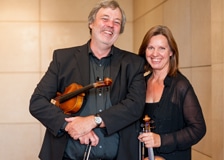
media release:
James Clark will step down from the Royal Scottish National Orchestra (RSNO) later this month after five years as co-leader. James, who is also co-leader of the Royal Liverpool Philharmonic Orchestra, is based in Merseyside, and aims to spend more time with his family as well as concentrate more of his time on performing chamber music.
James Clark’s final appearances as RSNO Leader will be accompanying Ballett am Rhein at the Edinburgh Playhouse, where the Düsseldorf-based ballet company performs Seven, choreographer Martin Schläpfer’s full ballet response to Mahler’s Symphony No7.
Clark became a well-known figure at the front desk of the first violins as guest Leader following the retirement of Edwin Paling in 2007. In 2010 he was appointed to the specially-created position of Principal Guest Leader, and in 2011 accepted the permanent joint leadershipalongside Maya Iwabuchi. In August 2011 Clark won a Herald Angel Award, recognising his outstanding performances at that year’s Edinburgh International Festival.
RSNO Leader James Clark: “I have fond memories of working with my colleagues at the RSNO and have hugely enjoyed the times we’ve worked together – it’s an ensemble with a strong artistic identity and dynamic quality and I’m proud to have played a part in its continuing development.
“Particular highlights for me have been recording and performing American music with Music Director Peter Oundjian, recording and performing the orchestral works of Debussy with Stéphane Denève, our appearances at the Edinburgh International Festival, touring across Scotland – including a wonderful week-long residency in Shetland, where we collaborated with local musicians, and at the St Magnus Festival in Orkney – and performing at the BBC Proms at the Albert Hall.”
RSNO Music Director Peter Oundjian: “Working alongside James has been an absolute pleasure. His talent as a top-flight orchestral musician cannot be questioned, but our shared background as quartet players has made these years of shared music making particularly meaningful. He leaves with us a legacy of an ensemble in great shape, and we would all like to wish him the very best for the future.”
The RSNO will be inviting guest leaders to join the musicians while the search for a successor to James Clark is undertaken.
Having fallen sick with an ear infection at the weekend, the globe-trotting Chinese pianst has pulled out of a Bartok concerto with the Philharmonia Orchestra at the Edinburgh Festival tomorrow.
He is to be replaced, in a different concerto, by Pierre-Laurent Aimard.
Lang Lang has been the festival’s concert headliner. He’s hoping to be fit for Friday’s recital.
His hyperactive social media team have failed to announce the cancellation.
